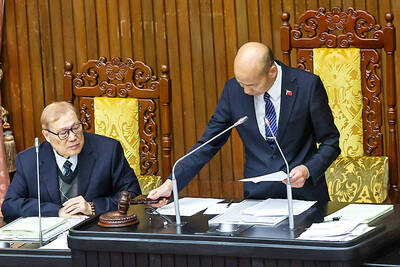The US economy is enjoying a growth spurt that will not last beyond this year because it is driven by military spending and tax cuts while the George W. Bush administration turns a blind eye to a looming deficit crisis, American economists said in Havana on Monday.
"Developing countries that still rely on the American market as an engine of growth should be cautious about expecting too much after 2004," said University of Texas professor James Galbraith at an annual economists conference on globalization issues hosted by Cuba.
Economic Nobel laureate Daniel McFadden warned that the US was heading toward a generational demographic crisis in social security and Medicare that will require government funding, and in turn imply unsustainable deficits.
"The current administration in Washington is making no serious effort to deal with the looming failure of its programs," McFadden said in a lecture to 1,300 economists from 43 countries.
"There is a high risk that social and financial turmoil will result, threatening the continued prosperity of the US economy and the stability of the globalized markets in which it is a key player," he said.
Galbraith said the current "spurt of growth" in the US economy was kicked off by the increase in military spending for the Iraq war and sustained over the summer by an infusion of cash into household spending.
"We are going to see another such infusion in the second quarter, so it is not over yet," he said, but added that future tax cuts will not add to household spending and that a slowdown is predictable.
Galbraith, son of Harvard economist John Kenneth Galbraith, said the Bush administration ran policies designed to make the economy stronger in the short run, such as child credits and last year's tax cuts, to enhance its chances in this year's elections.
While the Federal Reserve said it can be patient before it raises very low interest rates, it will come under pressure to defend the dollar through higher rates, he said.
"Whether they yield to that pressure is more a question of when than if. I would not be at all surprised to see interest rates rising next year and that will cause further problems," Galbraith said.
McFadden won the Nobel Prize in 2000 with James Heckman, who also attended the Havana conference, for developing econometric theories and methods widely used in the statistical analysis of individual and household behavior.
McFadden said the unregulated flow of speculative "hot money" had created global financial volatility and burdened developing nations with unpayable debt and attacks on national currencies.
The support provided to nations in difficulties by the International Monetary Fund is often "cold comfort" due to painful austerity demanded in return for bailouts.
"We need to cool down hot money, keeping long term flows while reducing short term volatility, and warm up the cold comfort currently provided by the IMF to countries that are in trouble," he said.

DEFENDING DEMOCRACY: Taiwan shares the same values as those that fought in WWII, and nations must unite to halt the expansion of a new authoritarian bloc, Lai said The government yesterday held a commemoration ceremony for Victory in Europe (V-E) Day, joining the rest of the world for the first time to mark the anniversary of the end of World War II in Europe. Taiwan honoring V-E Day signifies “our growing connections with the international community,” President William Lai (賴清德) said at a reception in Taipei on the 80th anniversary of V-E Day. One of the major lessons of World War II is that “authoritarianism and aggression lead only to slaughter, tragedy and greater inequality,” Lai said. Even more importantly, the war also taught people that “those who cherish peace cannot

STEADFAST FRIEND: The bills encourage increased Taiwan-US engagement and address China’s distortion of UN Resolution 2758 to isolate Taiwan internationally The Presidential Office yesterday thanked the US House of Representatives for unanimously passing two Taiwan-related bills highlighting its solid support for Taiwan’s democracy and global participation, and for deepening bilateral relations. One of the bills, the Taiwan Assurance Implementation Act, requires the US Department of State to periodically review its guidelines for engagement with Taiwan, and report to the US Congress on the guidelines and plans to lift self-imposed limitations on US-Taiwan engagement. The other bill is the Taiwan International Solidarity Act, which clarifies that UN Resolution 2758 does not address the issue of the representation of Taiwan or its people in

The Philippines yesterday criticized a “high-risk” maneuver by a Chinese vessel near the disputed Scarborough Shoal (Huangyan Island, 黃岩島) in a rare incident involving warships from the two navies. The Scarborough Shoal — a triangular chain of reefs and rocks in the contested South China Sea — has been a flash point between the countries since China seized it from the Philippines in 2012. Taiwan also claims the shoal. Monday’s encounter took place approximately 11.8 nautical miles (22km) southeast” of the Scarborough Shoal, the Philippine military said, during ongoing US-Philippine military exercises that Beijing has criticized as destabilizing. “The Chinese frigate BN 554 was

LEISURE: The new law adds Confucius’ birthday, the anniversary of the Battle of Guningtou, Constitution Day and Little New Year as national holidays The Legislative Yuan yesterday passed new legislation adding four national holidays and making Workers’ Day a national holiday for all sectors. The Chinese Nationalist Party (KMT) and the Taiwan People’s Party used their combined majority in the legislature to push the jointly proposed draft through its third and final reading. This new law supersedes the existing regulations for the implementation of memorial days and state holidays, which are administered by the Ministry of the Interior. The new law recognizes Confucius’ birthday on Sept. 28, the anniversary of the Battle of Guningtou on Oct. 25, Constitution Day on Dec. 25 and “Little New Year,”